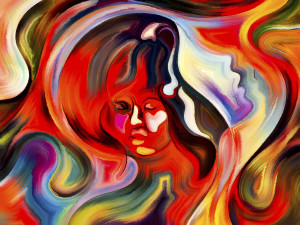Our Goals Are Limited By Beliefs, But Self-Awareness Opens The Door
A person experiencing depression or an eating disorder will never get better until certain mental roadblocks are overcome. Those mental roadblocks often reflect outdated or unhealthy belief systems that the person has subconsciously incorporated into life choices. Those choices might stem from past experiences, internalized criticism or long-standing fears. Past experiences from childhood, peer-pressure in school, or a strict religious upbringing make up the whole person, even when the parts are somewhat dysfunctional and crippling.
The truth is, our goals can only go as far as our belief systems will allow. The great news is that self-awareness is a sign that we are ready for progress. Filling the gap between dropping unhealthy belief systems and arriving at true self-awareness is what cognitive behavioral therapy is all about.
What Is A Personal Belief System?
A personal belief system is a set of beliefs you have about yourself--"I'm smart. I'm fat," etc. Provided the positive beliefs are based on reality, the belief system promotes healthy and productive interaction with people and life situations.
On the other hand, unhealthy beliefs are the ones that lead to the inertia of depression, and attendant problems like overeating. Also, the beliefs are sustained by constant reinforcement of negative self-talk. For example, returning to the belief that "I'm fat," is often based on a deeper belief that you are powerless in overcoming temptation and that "it runs in the family."
Identifying Your Core Beliefs
 You may smile when you hear an actor playing a psychologist in a movie or TV show say to a patient,
You may smile when you hear an actor playing a psychologist in a movie or TV show say to a patient,
"How does that make you feel?" However, that question lies at the root in solving the mysteries of what we believe. In short, being aware of our emotions is the critical element.
Take the dysfunctional beliefs that lie at the root of prejudice. When you say, "I can't stand people whose lifestyles are (fill in the blank)," you are superimposing your belief system on a group of people who neither know you and are not affected in any way by your beliefs.
So what you believe can be a blockade to tolerance and understanding. You will never move forward and become a better, more inclusive person until you recognize that the words, "I can't stand" are a key to identifying core beliefs, which may not stand up to objective scrutiny. They are based on emotion subjective, irrational emotions are often the core of an unhealthy belief system.
Altering An Unhealthy Belief System
Whatever unhealthy beliefs you have about yourself, you should realize that they are neither permanent, nor impermeable to change. With guidance, practice and application, you can begin to develop positive beliefs about yourself.
Remember that the reason you adopted those unhealthy beliefs is that you are the sum total of your experiences. Those experiences are the tapes that play over and over in your head and reinforce your belief system. Your beliefs, in turn, can either be true or untrue. To the extent they are untrue; they are dysfunctional emotions, which you articulate in terms of your own self-image. They sustain what is and isn’t true about yourself.
Also, since untrue beliefs are crippling rationalizations, you need to sweep them away and make room for positive changes in your life. Are beliefs such as, "I'm too old to learn something new" keeping you from enrolling in that additional skills training you need? If so, consider the following:
- Whatever you think you can’t do, someone just like you in similar circumstances is out there doing exactly what you want to be doing. Why? Because that someone has different beliefs and the positive references of successful experiences that support those beliefs.
- It is healthy to be in the habit of questioning your beliefs in order to be constantly evolving and developing new beliefs at the same time. That takes practice and a change in mindset, which may take you out of your comfort zone.
- When you take the time to judge whether your beliefs are serving you well, you reward yourself in the best way possible: You eliminate bad or untrue beliefs that no longer serve you. This house cleaning is the first step in personal and emotional growth.
- We engage in spring-cleaning for our homes; we clean out our desks and closets, and we even cut out people and circumstances in our lives that no longer suit us. Why not clean out those dysfunctional and useless beliefs as well?
A Template For New Beliefs
In weight management, for example, a person with a chronic eating disorder--binging, eating when stressed, etc.--can adopt new beliefs to begin the path towards sensible weight control by adopting a new belief system:
- I’m fit and healthy and I deserve to have the body I desire and live a life that I love.
- I’m prepared each day with healthy foods and a daily plan and action strategy.
- I do something physical every day to celebrate my aliveness.
- Overeating never makes me happier; it only makes me heavier.
- I practice meeting my own needs and I don’t allow others to derail my efforts.
- With a little direction, I can accomplish anything I set my mind to.
- Life is full of rich possibilities and I enjoy the best that life has to offer.
How does one get to a belief system exemplified by the foregoing? It is a matter of learning new self-conversational techniques and practice, practice, practice. Each new belief can bring the introspection and a new plan of action that involves work and constant reinforcement.
The Pathway To The Truth Is Through The Subconscious
Learning how to communicate with your subconscious mind in a language it understands will help you overcome depression or manage your weight once and for all. In the end, the only way to change your beliefs is to change what you say to yourself on a daily basis, or what we call your “inner monologues.”
When you learn the correct words to say to yourself, you will have the guidance and motivation you need to keep yourself on track any time you need it. No matter who you are, where you are in your life, or what has happened to you in the past, you can change your inner monologues.
Pathways Real Life Recovery can help you change your unhealthy beliefs. If you’re struggling, pathways can help. We offer programs such as Cognitive Behavioral Therapy and Belief Restructuring. Contact us here, or call for a free consultation.
You can download a PDF of this page here.

